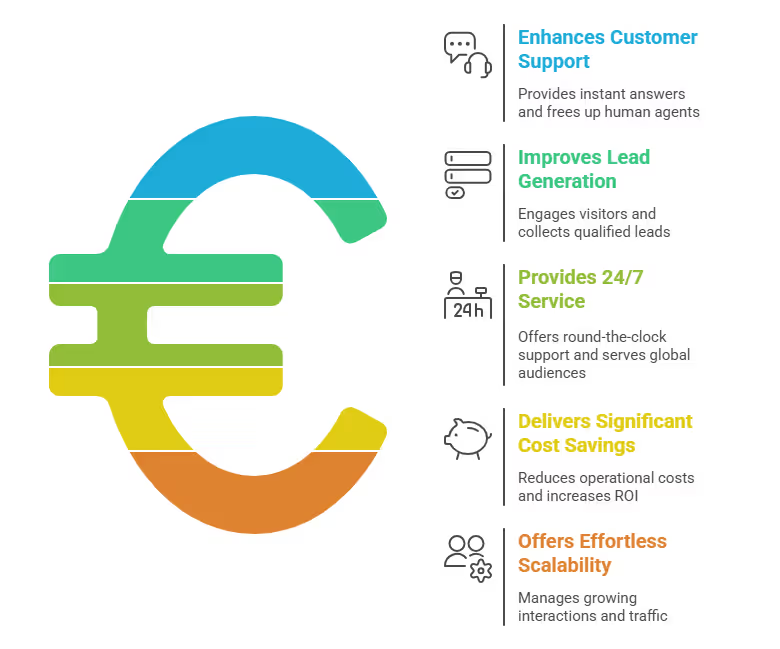Why Custom GPT AI Chatbot Solutions Are Replacing Traditional Support?

In 2026, custom GPT AI chatbot solutions have transitioned from experimental tools to core business infrastructure. Unlike generic AI, these solutions are trained on a company's specific datasets to provide context-aware, brand-aligned responses that standard models cannot replicate.
Core Capabilities & Use Cases of Custom GPT AI Chatbot Solutions
Custom GPTs go beyond basic Q&A, evolving into "AI Agents" capable of multi-step task execution.
- Customer Support: Resolving up to 80-93% of routine inquiries and providing 24/7 assistance across global time zones.
- Sales & Lead Generation: Prequalifying prospects, scheduling demos, and guiding users through conversational sales funnels.
- Internal Operations: Providing employees with instant access to complex HR policies, technical documentation, and historical support tickets.
- Specialized Industries:
- Healthcare: Integrating HIPAA-compliant records for symptom triage.
- Legal: Summarizing vast document arrays and tracking international regulatory updates.
- Finance: Analyzing transaction data to provide personalized financial advice.
Architectural Components of Custom GPT AI Chatbot Solutions
Modern custom GPT solutions rely on a "Retrieval-Augmented Generation" (RAG) framework rather than simple fine-tuning.
- Knowledge Ingestion: Advanced platforms now support over 1,400 file types, including PDFs, Google Docs, Notion, and even audio files.
- Reasoning Engine: Uses Large Language Models (like GPT-5 or Claude 3.5) to interpret user intent and process data.
- Memory & State: Maintains context across multi-turn conversations to remember previous user preferences or session details.
- Fallback Logic: Implements "Human-in-the-Loop" models where the AI seamlessly escalates complex or sensitive queries to live agents.
Top Platforms for Custom GPT AI Chatbot Solutions in 2026
Platforms vary based on their balance of "no-code" ease versus "pro-code" flexibility.
- CustomGPT.ai: Leader in no-code knowledge management; features anti-hallucination technology and support for 92+ languages.
- Botpress: Best for advanced customization and complex logic flows; widely used for enterprise-grade support.
- Intercom: Premier omnichannel solution for enterprise customer engagement across web, social, and mobile.
- Manychat: Best for marketing automation specifically on social platforms like Instagram and WhatsApp.
- Anthropic Claude for Business: Favored by highly regulated sectors (finance/government) due to its emphasis on AI safety and ethical alignment.
Implementation Roadmap for Custom GPT AI Chatbot Solutions
- Strategy: Define specific goals (e.g., reducing support tickets by 40%) and identify target data sources.
- Data Curation: Clean and organize proprietary data to ensure accuracy and reduce biases.
- Integration: Use APIs to connect the bot to CRMs (Salesforce, HubSpot) or internal databases.
- Testing: Use simulation modes to run the AI against thousands of historical tickets before going live.
- Security: Ensure compliance with GDPR, SOC2, or CCPA, and implement data isolation to prevent leaks.
Differences from Traditional Chatbots and Custom GPT
Custom GPTs represent a significant leap forward from older chatbot technology. Traditional bots are rule-based, meaning they follow a predefined script and can only respond to specific commands or questions.
- Flexibility: Traditional bots fail when a user asks something unexpected or outside their programming. GPT chatbots are highly adaptable; they use their broad training to handle a wide variety of topics and engage in free-form conversations.
- Contextual Awareness: Traditional bots cannot remember the context of a conversation for very long. In contrast, GPT-powered bots can understand and recall previous parts of a dialogue, leading to more coherent and meaningful interactions.
- Conversational Quality: Conversations with traditional bots often feel rigid and limited. A custom GPT provides a more dynamic and natural user experience, making the conversation feel more like talking to a human expert.
Curious about building your own GPT-powered chatbot? Talk to our team and explore how a custom AI solution could work for your business.
Key Benefits of Custom GPT AI Chatbots
Custom GPT AI chatbots are transforming how businesses interact with their customers. These intelligent assistants use advanced language models, trained specifically on your company's data, to deliver precise and context-aware conversations. By integrating a custom chatbot, companies can unlock powerful advantages that enhance efficiency, improve user engagement, and drive growth.
They move beyond simple, pre-programmed responses to offer dynamic and truly helpful interactions.

Here are the key benefits of using a custom GPT AI chatbot:
Enhances Customer Support
- A chatbot provides instant answers to frequently asked questions.
- It frees up your human support agents from handling repetitive inquiries.
- This allows your team to focus on solving more complex customer problems.
- It handles multiple customer conversations at the same time without delays.
Improves Lead Generation
- The chatbot actively engages visitors on your website.
- It asks targeted questions to qualify potential leads.
- It naturally collects contact details and user requirements during the chat.
- It sends qualified leads directly to your sales team for immediate follow-up.
Provides 24/7 Service
- Your business offers support around the clock, even on holidays.
- Customers get the help they need outside of standard business hours.
- This continuous availability improves customer satisfaction and loyalty.
- It effectively serves a global audience across different time zones.
Delivers Significant Cost Savings
- Automating customer interactions reduces the need for a large support staff.
- You lower operational costs related to salaries and training.
- A single chatbot manages the workload of several agents.
- This leads to a higher return on investment over time.
Offers Effortless Scalability
- A chatbot easily manages a growing number of user interactions.
- It handles sudden increases in website traffic without affecting performance.
- You can scale your support capacity instantly during marketing campaigns.
- This ensures a consistent service quality as your business expands.
How to Build a Custom GPT AI Chatbot
Creating a custom GPT AI chatbot helps you deliver personalized user experiences and automate tasks effectively. By building your own, you tailor its knowledge and personality to perfectly match your brand's voice and meet specific business goals.
A well-executed plan ensures your chatbot is not just a tool, but a valuable asset for your organization.
Develop a Clear Strategy
- First, you must define the chatbot's main goal. Decide if it will answer customer questions, generate sales leads, or assist with internal tasks.
- Next, identify your target audience. Understand their needs and the types of questions they will likely ask to ensure the chatbot provides relevant answers.
Train with Quality Data
- You need to gather high-quality, relevant data to train your model. Use your company's documents, website content, FAQs, and past support conversations.
- Fine-tune a pre-trained base model, like one from the GPT family. This process teaches the model your specific business context and vocabulary for more accurate responses.
Integrate into Your Systems
- You can integrate your chatbot into your website, mobile app, or messaging platforms like Slack or Microsoft Teams.
- Use APIs (Application Programming Interfaces) to connect the chatbot to your existing software. This allows it to fetch real-time information, like order statuses or user account details.
Conduct Thorough Testing
- You must test the chatbot extensively before launching it. Actively look for incorrect answers, conversational dead-ends, and technical glitches.
- Collect feedback from a small group of test users. Use their input to refine the chatbot’s performance and improve the user experience.
Ensure Security and Compliance
- You must prioritize protecting user data at all times. Implement strong security measures to prevent unauthorized access to sensitive information.
- Make sure your chatbot complies with data privacy regulations like GDPR or CCPA. This builds trust with your users and avoids legal issues.
Ready to explore GPT chatbots built around your data and use cases? Let’s scope a solution together
Risks & Challenges of AI Chatbots
While offering significant benefits, implementing AI chatbots comes with notable risks and challenges that organizations must address proactively.
- Data Privacy and Security: Chatbots often handle sensitive user information, making them prime targets for cyberattacks. The risk of data breaches is high, and organizations must ensure robust encryption and compliance with regulations like GDPR or CCPA to protect user data and maintain trust.
- Bias in Data: AI models are trained on vast datasets, which can contain historical or societal biases. If left unchecked, these biases can be reflected in the chatbot's responses, leading to unfair or discriminatory outcomes. It's crucial to continuously audit the training data and model outputs to mitigate this risk.
- Over-Automation and Loss of Human Touch: Relying too heavily on chatbots can lead to a dehumanized customer experience. In complex or emotionally charged situations, a chatbot may fail to provide the empathy or nuanced understanding that a human agent can, potentially frustrating users and damaging brand reputation.
- Building and Maintaining User Trust: Initial interactions with a chatbot can be met with skepticism. Users need to feel confident that the chatbot is reliable, accurate, and genuinely helpful. A single negative experience, such as a misunderstanding or a nonsensical response, can erode trust and discourage future use.
The Future of Custom GPT AI Chatbot Solutions in the USA
The landscape of custom GPT AI chatbot solutions is evolving rapidly in the USA, driven by technological innovation and market demand.
- Evolution of AI Capabilities: The next generation of chatbots will move beyond simple question-and-answer interactions. They will become more sophisticated, with enhanced reasoning, memory, and the ability to learn from real-time conversations, making them more like intelligent assistants.
- Rise of Multimodal Chatbots: Future chatbots will not be limited to text-based conversations. They will be able to process and generate responses using multiple modalities, including images, video, and voice. This will enable more natural and intuitive interactions.
- Growth of Agentic AI: A significant trend is the development of agentic AI, where chatbots can not only answer questions but also perform complex, multi-step tasks autonomously. For example, a chatbot might not only help a user book a flight but also track the best prices and notify the user of changes, acting as a proactive personal agent.
Why Hakuna Matata Is Your Best Bet for Custom GPT AI Chatbot Solutions?
Look, I’ve spent 20 years building AI solutions, and I know the U.S. market like the back of my hand. At Hakuna Matata, we’re not here to sell you a generic chatbot like OpenAI or IBM.
We’re your partner, crafting solutions that:
- Fit your business like a glove, whether you’re in retail, BFSI, or e-commerce.
- Launch fast, fully integrated in 2-4 weeks.
- Deliver serious ROI, like 25% sales boosts or 40% cost cuts.
- Come with U.S.-based support, so you’re never left hanging.
We’ve helped businesses from coast to coast, and we’re ready to help you.
Grab Your Free AI Chatbot Guide and KT Session
You’re not just running a business, you’re fighting to stay ahead. A custom AI chatbot can be your secret weapon, saving time, boosting sales, and keeping customers happy. Don’t settle for generic tools that don’t get the U.S. market. At Hakuna Matata, we’ll build you a chatbot that’s as unique as your business.
Here’s the deal: Fill out the form below to get our free guide, “Skyrocketing ROI with AI Chatbots in 2025,” plus a 1:1 knowledge transfer session with me.
You’ll learn:
- How to cut support costs by 40% while keeping customers smiling.
- Secrets to boosting e-commerce sales or BFSI leads.
- A custom plan for your U.S. business, no strings attached.
Get Your Free Guide Now and let’s make your business unstoppable.

